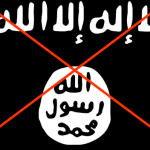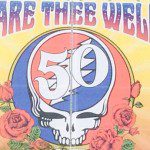My days generally begin with a cup of coffee and a trip to Patheos Pagan. One of my jobs as “channel manager” is scheduling posts for our Facebook feed. If this sounds unglamorous, well it is. The only real upside to it is that I get to read a lot of great stuff while my head gently defogs.
This morning I find myself (very) slightly perplexed by two of my favorite writers here. The first is John Beckett at Under the Ancient Oaks who writes: “Must we always obey the Gods or suffer great calamities?” The second is Molly Khan from Heathen at Heart: “Altars are usually simple, but there is an emphasis on quality, with less-expensive representations of the Gods seen as undesirable.” Can you spot what’s similar about these sentences?

Until this morning I had no idea that it was becoming commonplace in Modern Paganism to capitalize “Gods” when speaking of deities. I guess it looks polite, and I’m certain that it’s meant to honor those gods, but it’s something that just strikes me as a little odd. For me, capitalizing gods would be like capitalizing the word dudes, and I don’t think that’s anywhere we want to go. “Pay your devotions to the Dudes.” Doesn’t that just look wrong?
I realize that not everyone has such a casual relationship with their gods, but for me they can certainly be “the dudes.” I don’t have conversations with them as if they are hipsters at my local watering hole, but we communicate, and it’s generally a very positive and often informal thing. What strikes me as odd about Molly and John’s sentences are that they aren’t even referring to their personal deities, but gods in general.
What to capitalize in Paganism has long been a tricky and confusing subject. I always tend to capitalize the word Pagan when referring to someone who self-identifies that way. Peg Aloi who is an academic and writes here at The Witching Hour does not. Is Witchcraft a religion or a practice? Depends on who you ask, and the definition one chooses has a lot to do with how the word is subsequently written.
What follows are some of the more troublesome words in Modern Paganism and how I approach them. This is not a style guide, and how people approach capitalizing words within Paganism is often a very personal thing. This is just how I do it, and I’m sharing it with all of you simply because it’s on my mind.
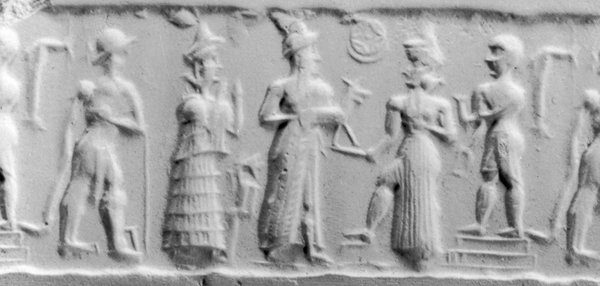
Pagan and Paganism: These are words I capitalize when they are used as self-identifiers. “My name is Jason and I’m a Pagan and I practice Paganism,” is an example of that. There’s a lot of disagreement on what the word “Pagan” means in 2015 but as long as it’s being used to identify our large and eclectic community it should probably be in uppercase.
When using the word to describe ancient beliefs and practices I use the lowercase p. “The Ancient Greeks practiced paganism,” is an example of this. Since the Greeks would not have referred to their religion as “paganism” I keep it in lowercase. Ancient Europe wasn’t full of paganism back in the day it was full of paganisms, lots of different religions which today are grouped under the word pagan. Nobody would have self-identified that way.
Today though, it’s possible to be a follower of the Greek Gods and identify in a way that calls for the uppercase “p.” If someone describes themselves as a Hellenic Pagan uppercase is the way to go.
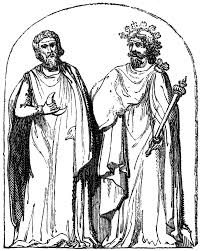 Druid and Druidry: We don’t know a whole lot about the ancient druids, but the word is kind of like a job title. “What do you do for the community?” “Well, I’m a druid.” It’s probably the equivalent of a judge or minister today. As a result of this I don’t capitalize the word when writing about the druids of antiquity. They practiced a Celtic Religion, not a religion called druidry.
Druid and Druidry: We don’t know a whole lot about the ancient druids, but the word is kind of like a job title. “What do you do for the community?” “Well, I’m a druid.” It’s probably the equivalent of a judge or minister today. As a result of this I don’t capitalize the word when writing about the druids of antiquity. They practiced a Celtic Religion, not a religion called druidry.
Modern Druids are an all together different fish. Because they self-identify as Druids and that identity forms their spiritual selves I capitalize the word. If they describe their faith as Druidry, that also goes in caps. There are also Druid social orders, and since I capitalize Freemason and Masonic I extend that courtesy to the word Druid too.
Witchcraft, Witches, and Wicca: Wicca refers to a religious path and should always be capitalized. The words Wicca and Wiccan have no other context in 2015. Sadly, the easy stops there, and the other two words included in this section are far more problematic.
For many of us the words Wicca and Witchcraft behave like synonyms. The title of Gerald Gardner’s books on Witchcraft were called Witchcraft Today and The Meaning of Witchcraft. He was referring to a religious practice in those titles; in addition, he didn’t even use the word Wicca as we use it today.
This is a big issue to some people because the word witchcraft is also used to signify a practice instead of a spirituality, and there are many out there who see this is as the true meaning of the word. In such a context witchcraft is simply a way to approach magic, and one can be both a religious something and practice witchcraft separately from that. “I’m a Christian who practices witchcraft” is an example.
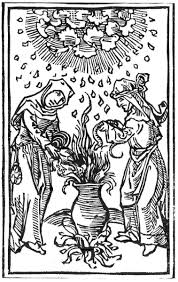
The words witch and witchcraft are often used in a very broad sense as well. Often anyone who practices an indigenous form of folk-magic is labeled a witch. Since witch is an English word and the practitioners themselves wouldn’t identify themselves that way I keep the w lower-case. For me the self-identity thing is always the most important, if one thinks of themself as a Witch then I capitalize the word. If I’m hoisting an identity onto someone else (like a cunning-person who would have identified as, well, a cunning-woman or cunning-man) then I use witch with the lower-case spelling.
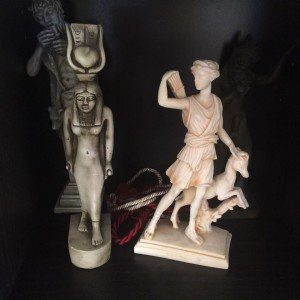 Polytheism and Polytheist: Two years ago this wouldn’t have been an issue but with the rise of the term polytheism as a descriptor for a religious movement it now has to be addressed. If someone’s primary means of self-identification is polytheism, then I will call them a Polytheist with a capital p. But I don’t think most people do that, at least not yet. I think of myself as a polytheist, but my primary means of self-identification is British Traditional Witch. In my case it’s an adjective to describe how I view (my) Wicca, it’s not a general term of self-identification. Many polytheists identify with particular traditions, and in those case I capitalize the tradition and not the descriptor.
Polytheism and Polytheist: Two years ago this wouldn’t have been an issue but with the rise of the term polytheism as a descriptor for a religious movement it now has to be addressed. If someone’s primary means of self-identification is polytheism, then I will call them a Polytheist with a capital p. But I don’t think most people do that, at least not yet. I think of myself as a polytheist, but my primary means of self-identification is British Traditional Witch. In my case it’s an adjective to describe how I view (my) Wicca, it’s not a general term of self-identification. Many polytheists identify with particular traditions, and in those case I capitalize the tradition and not the descriptor.
Polytheism is quickly becoming an umbrella term for many people who practice polytheism and feel left out of the broader Pagan Community. When Polytheism and Polytheist are being used to identify someone in this community they get the big P. This will probably require more nuance in the future as our community fractures and more people gravitate towards Polytheism as a movement.
Gods, gods, and God: We’ve now come full circle and have returned to the word that started this article. Generally when I’m writing about various deities and using the word gods it remains lowercase. It’s possible that I might choose to capitalize the word gods if I were referring specifically to my gods, something like “these are the Gods of my household,” but even then I think that looks a little funny. To me the word god signifies a “particular type of being,” it’s not an honorific, so it doesn’t get capitalized.
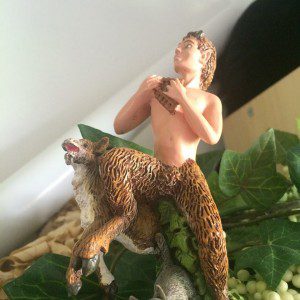 Lately I’ve tried to avoid the word “gods” while writing because it infers maleness, all while being used to reference dozens of deities representing every aspect of human sexuality. Because of this I’ve gotten into the habit of mostly using deity and/or deities to make sure my meaning is clear. Also using a capital g in gods might infer to the casual reader that one is writing about Yahweh. I don’t want lazy readers to think I’m writing about Yahweh unless I’m specifically writing about Yahweh.
Lately I’ve tried to avoid the word “gods” while writing because it infers maleness, all while being used to reference dozens of deities representing every aspect of human sexuality. Because of this I’ve gotten into the habit of mostly using deity and/or deities to make sure my meaning is clear. Also using a capital g in gods might infer to the casual reader that one is writing about Yahweh. I don’t want lazy readers to think I’m writing about Yahweh unless I’m specifically writing about Yahweh.
Monotheists often use the word god to signify their one deity. When writing about their god I’ll capitalize the word. For example: “Suzy told me that she worships God.” In such a context it’s rather likely that she’s referring to Jesus’s alleged father. “God” isn’t so much a descriptor as to what their god is as it is a name.
The terms The Goddess and The God are similar. Originally the terms “Goddess and God” were used as placeholder titles for specific deities in oathbound traditions. Eventually they became associated with specific deities in their own right. When The Goddess or The God are being used as the name of a higher power they get capitalized. When I’m referring to goddesses or gods they go back to lowercase, but that’s just me.
I try hard to be consistent with my capitalization because I think the use of lower and uppercase letters signifies specific ideas. Of course, what is here is just how I use them. Your interpretation (or Molly’s or John’s) may be completely different, and that’s just fine.


